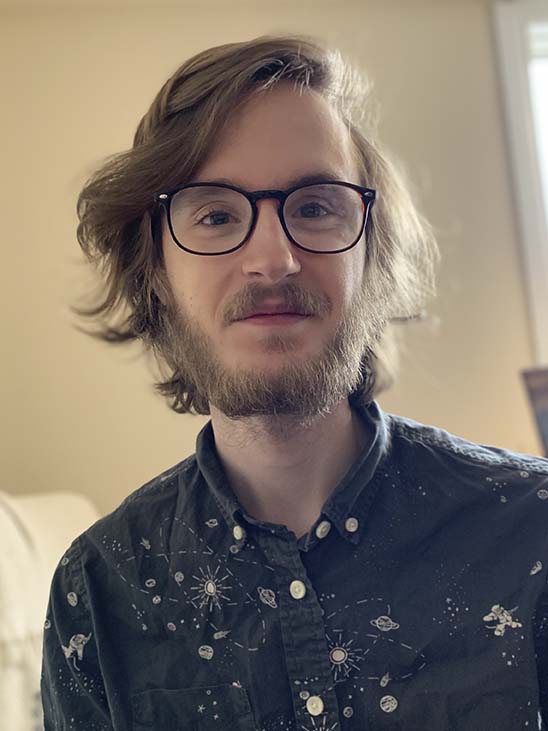Samuel Goldberg had just stepped off a plane in Toronto when he received the good news.
Goldberg, a fifth-year King’s student taking a combined honours in the History of Science and Technology and philosophy, was travelling back to Halifax in January from his home city of Philadelphia. After a turbulent flight and a trip through customs he sat down in the busy airport, opened his phone and read the email informing him that he had accomplished something few undergraduate students had.
Goldberg had been awarded the Sacknoff Prize for Space History.
 The Sacknoff Prize is offered by Space 3.0, a nonprofit organization in the United States that “aims to preserve space history, empower entrepreneurs, and secure the future.” Since 2011, the annual Sacknoff Prize has encouraged university students to submit a long-form essay pertaining to some aspect of space history. The winner gets their essay published in Quest: The History of Spaceflight Quarterly. They also get a cash prize, a one-year subscription to Quest, and an invitation to present at the annual meeting of the Society for the History of Technology (SHOT).
The Sacknoff Prize is offered by Space 3.0, a nonprofit organization in the United States that “aims to preserve space history, empower entrepreneurs, and secure the future.” Since 2011, the annual Sacknoff Prize has encouraged university students to submit a long-form essay pertaining to some aspect of space history. The winner gets their essay published in Quest: The History of Spaceflight Quarterly. They also get a cash prize, a one-year subscription to Quest, and an invitation to present at the annual meeting of the Society for the History of Technology (SHOT).
Goldberg’s winning essay, “Falling with Style: Zero-Gravity in Early Spaceflight Thought,” began as an idea for his honours thesis.
“I’m interested in understudied areas and topics [in space history],” he says. As the title of his essay suggests, the idea of weightlessness factors into this.
“I had this intuition that weightlessness itself, the phenomenon, was not sufficiently discussed in early space flight thoughts,” he says.
Goldberg’s work focused on the period in space flight history from the start of the 20th century up to the 1930s. He was interested in exploring how groups of theorists from the United States and Europe—everyone from engineers and writers to people with medical backgrounds— navigated a phenomenon that was rarely experienced at the time.
“What tiny bits of freefall did they experience, whether it’s falling in an elevator or jumping off a swing?” Goldberg asks. “How were they extrapolating from that tiny experience we’ve all had, and from an interdisciplinary approach?”
Goldberg’s interest in space history predates his university days—he chose King’s because he was inspired by the HOST program and the work of its recent graduates, namely space flight historian Amy Shira Teitel, BA(Hons)’08.
He had long been aware of the Sacknoff Prize. Conveniently, submissions opened around the time Goldberg finished his thesis and as his advisor, Professor Stephen D. Snobelen, was encouraging him to publish it.
“I regularly told him to write his thesis as if he were submitting it to a mainstream, not merely undergraduate, journal,” Snobelen explains in an email. “One reason why I was gratified to hear that Samuel had won the Sacknoff Prize was that his paper would be published. I must stress that it is very, very rare for an undergraduate to publish in a mainstream journal.”
With Snobelen’s help, Goldberg made a few changes. He explored aspects of science fiction and expanded the scope and timeline of what he’d already focused on, before submitting the essay in November 2021.
Snobelen expands on the significance of Goldberg winning the Sacknoff Prize as an undergraduate.
“The prize is open to both enrolled undergraduates and graduate students, but because graduate students —and these could be PhD students as well as MA students—are generally working at a higher and more theoretically sophisticated level than undergraduates, it isn’t surprising that the prize goes mostly to graduate students,” he writes. “With this in mind, Samuel’s award is all the more impressive.”
So, what’s next for Goldberg?
He’s planning on taking a year off to recharge, and then hopping back into his study of space history.
“I have two areas that I’m really interested in. One is early spaceflight history, that is, before the space race,” he says. “…and I think space medicine is really interesting.”
As Goldberg waits for more details about the publication of his award-winning essay, he expresses his gratitude not only for Snobelen’s advice, but for the help of the entire HOST department.

